
Hello. I’m the Doctor.
Well… OK. I’m not. But I really wish I was. I can actually class it as a major ambition of mine. I dress somewhat eccentrically with scarves and cravats, I have a tendency to wave my hands about when I speak and I don’t like screwdrivers that aren’t sonic.
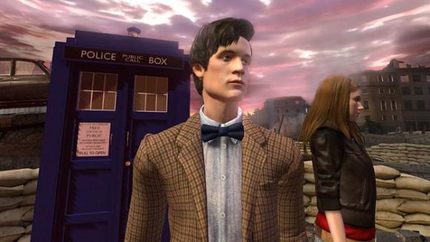
With this in mind, it continues to be a personal pet peeve of mine that I have yet to find a game that suitably satisfies my urge to travel the universe as my favourite time-travelling hobo. There have been numerous attempts at creating a Doctor Who game in the past. They’ve varied quite considerably from text adventures on the BBC Micro to the more recent Doctor Who: Legacy puzzle game for mobiles. I tend to find though that gameplay is usually limited, even in the most modern examples. Some have fairly well thought out stories but on the whole all the games made tend to feel more like gimmicks and amusing little distractions than a solid attempt at capturing the grand scope of the TV show.
I can appreciate the dilemma. On the face of it a Doctor Who game has to live up to the ideals of the show; a show which at its core has a hero who doesn’t tends to actively avoid conflict whenever possible. With this in mind it is tough to build an experience that gamers of all ages can enjoy while still keeping the game action packed and interesting.
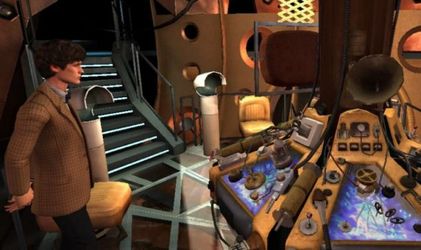
With the possibilities being quite simply as endless as the Universe is old, it’s time to spin a few ideas together and see what we come up with… Allons-y!
Gameplay
'Just a mad man with a box.'
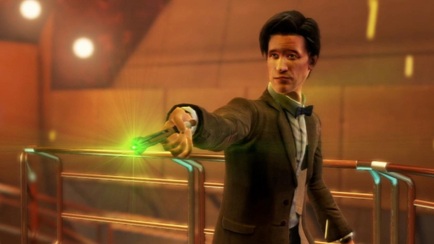
You have spent your entire life running from place to place, being terribly marvelous and saving countless worlds on a daily basis in a police phone box that is bigger on the inside. But what kind of Doctor would you be? Each Doctor has his own unique personality and style, and every fan has their favourite so by all rights any inclusive game would let the player decide for themselves. Better yet, the player would be allowed to customize their own Doctor in appearance and personality. Conversations in the game can take the form of having multiple possibilities for how the Doctor may respond. Do you want your Doctor to be aggressive? Arrogant? Sarcastic? Caring? In the end it’s down to the player to make these choices and form the Doctor they want him to be. This in itself should have an effect on the gaming world. If upon first meeting the Daleks, for example you are fairly passive and come across as fairly goofy, they might not see you as much of a threat in encounters to come. However, if you are aggressive towards them, like an oncoming storm, then they might just realise that the Doctor is someone to fear.
Along the way you would have to level up the Doctor in a typical RPG fashion, which helps lend to how he will be able to get through any given situation. A lot of the possible categories for levelling would be quite familiar such as charisma, electronics, stealth, first aid or even demolition. These would help add to the uniqueness of your own Doctor and play to your own strengths. However it would be important to note that it should not be possible to level up everything to the max. The Doctor has never been perfect and he can’t do everything, despite what he may say or how he may bluff his enemies.
'Have you met Miss Smith? She's my best friend.'

They help ground him in reality and can often get him out of a sticky situation or two when his alien nature just isn’t good enough. This presents the prospect of an interesting dynamic in the game where the player may get the possibility to choose their own companion while travelling. There may be a few familiar faces in the bunch but also some brand new ones with their own traits that can be brought on the adventure, depending on their profession, background and personality. A companion with a military background might be good at getting the Doctor out of a tight spot in a fight. A more peaceful soul may be more diplomatic. In terms of how to best bring out their talents, this would be another choice for you. Perhaps they would be dependent on the Doctor to give them commands, or maybe they would learn to be autonomous and work on their own. This may get them into trouble or it may get the Doctor out of it. Either way I think letting your companion think for themselves would certainly make for an interesting time and make the game much less predictable.
Your interactions in the game may even impact on your relationship with them, where if you performed an act which cost a lot of lives your companion may choose to leave you and you’d be faced with finding another one. Worse still if they die on an adventure then this may have a detrimental impact on your Doctor’s emotional stability for the future.
'It's bigger on the inside.'
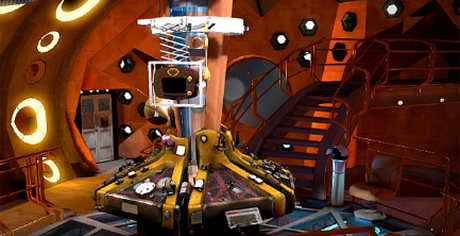
This would be his main means of transport and how he goes from one adventure to another. This would need to limited of course since no game could ever allow you to go truly anywhere in time and space, but fortunately the show has an in built explanation for this, given that the TARDIS never goes where the Doctor wants it to anyway. Nevertheless there would still need to be a wide variety of worlds and time zones to explore with a numerous enemies and the ability to free roam amongst them. I can imagine that there could be no end of side-quests, particularly if it were possible to have the Doctor’s interactions with NPC’s impact the game in different ways.
Obviously a Doctor who game couldn’t be a shooter. If anything a lot of it would be about avoiding combat rather than running into it. It would certainly have to be a game that makes you think. While I envisage third person RPG style elements, it perhaps should hark back to the older days of Lucasarts’ classic point and click games. You would have to use items and people around you to help you in any given situation, and more importantly you would have to figure it out for yourself. You are the Doctor after all, and therefore you should be the cleverest person in the room. The game should be difficult enough to give you a sense of having discovered something in such a way that it makes you punch the air in victory. (Or perhaps straighten your bow tie in victory).
Your trusty sonic screwdriver may ever be at your side, serving as a handy lock pick, hacking tool or scanner. It should be upgradeable, just as your Doctor can, to assist you more efficiently. The focus however should not be with the screwdriver to solve problems. Unlike the show it should not be used as some catch-all device, but more rather as a tool to help guide you on your way. In many ways the device could be used in a similar fashion to what we’ve already seen in Watch_Dogs; with it proving crucial in quick getaways or a method to hack into computer systems.
'This moment has been prepared for.'
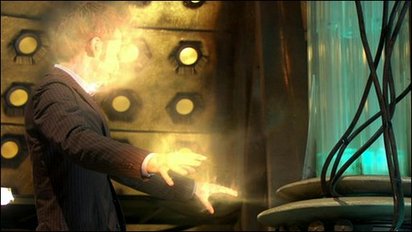
Regeneration has always been key to the show’s longevity and I see no reason why the same cannot work for a game. After a rather dicey adventure your Doctor may end up losing and require sacrificing himself to save the day. In this event your character that you have been building up may suddenly find himself a whole new man. Options you had before may suddenly be closed to you as his personality changes; and his once rugged good looks may be replaced by a grizzled old man to hinder any future running your Doctor may have to do. It may seem like a cruel dynamic to spring on a player when they mess up but it would certainly keep things interesting. You could of course customize your Doctor again and build him into who you want to be, but his physical attributes maybe scrambled just enough to give you more work to do.
I’ve skimmed on this so far but I think it’s important to say outright. A Doctor Who game should be all about choice. So many games now allow you to have multiple endings and have your character behave differently on each play, but this would be doubly important in a Doctor Who game. An event that might occur early on may have drastic implications for later in the game. How the Doctor may conduct himself may have a huge impact on how he is perceived throughout the whole universe, and so too may his companions. In so doing the game would be constantly changing and may have hundreds of possibilities within it.
However at the games heart should be the encouragement for the player to try hard and find the best solution for every problem so as to aid them later on. Having said this, it should be fair to say that while many choices may have a negative impact, there should always be positives with them as well. If the Doctor built up a reputation as a mighty warrior, that at least should strike fear in the hearts of his enemies and give him the opportunity to bluff his way to victory, even though the more innocent NPC’s may not wish to help him for the same reason. This in turn may be where an experienced companion will come in handy in order to gain the public’s trust instead of the Doctor and help him regardless.
By all means, complexity and hidden solutions should not be something to hide from.
Stay tuned for Part Two, coming next week!

Have you got anything to add in regards a Doctor Who video game project?
Come find us on Twitter or Facebook and let us know your thoughts!

 RSS Feed
RSS Feed
